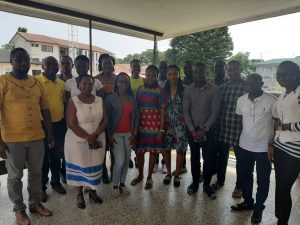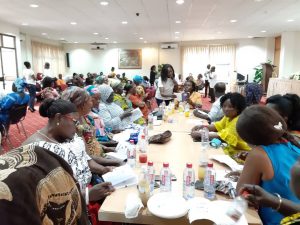It is said that one of the reasons that the poverty cycle remains prevalent is simply because low income households lack efficient financial risk mitigation strategies. When unexpected events occur such as sickness, death or other risks, families often sink deeper into the cycle of poverty. Insurance is able to safeguard against these risks, but unfortunately, insurance penetration remains significantly low in the African continent.
The National Insurance Commission in Ghana in partnership with GIZ have been exploring ways to increase insurance penetration in the country (which is slightly over 1%) specifically targeting micro and small businesses in Ghana. AB consultants was called upon to assist in the market research and creation of a manual that would inform the micro and small business clinics, which will be the inception of this attempt. Owing to our expertise in human centred research, the AB team embarked on a 2 week -market research in the Greater Accra region with the aim of better understanding the risks faced by the market traders and artisans in various locations.
The AB team trained and was assisted by research assistants drawn from the Ghanaian insurance industry. The team visited a total of 11 markets across the greater Accra region. The perception towards insurance was found to be negative with the reasons behind this centring around the belief that insurance doesn’t pay claims and the long complex claims process. It was noted that the market traders and artisans do face risks that can be insured but in order to do this, education and awareness creation is needed. A key finding from the research was the knowledge of financial services where it was found that most of the respondents met saved but what is even more interesting is the reason behind savings and credit was primarily to safeguard against unexpected events. This poses a huge opportunity for microinsurance that the Ghanaian insurance industry can explore.
It was important for us to know what the research assistants expectations were and what they learned throughout their research journey. What stood out to most of them was the importance of talking to people. Some areas exhibited some resistance in the beginning of research mostly due to their negative perceptions towards insurance. However, it was interesting to see how there was a turn around when the respondents noticed that the team was just there to hear them out. Not to sell to them; to learn from them and further understand their risks. The resistance faded off almost instantaneously when they realised that. They felt that they were part of the journey. It makes one think that co-creation is not just about encouraging buy-in. It is about letting the communities know that their experiences and knowledge are valid and can be used to design products that will ultimately affect their lives positively. It was a humbling experience to even hear them show willingness not only to pay for products catered for them, but also to learn and be educated on matters insurance.
Based on the findings of the market research, AB consultants developed an insurance and financial planning education program for the micro and small business clinics (MSBCs). The education program includes a unique aspect of gamification that combined the insurance awareness and risk identification rolled into one. Gamification has been identified as one of the successful ways of financial education that allows potential customers to experience insurance through simulation of real-life events and how they are dealt with. The game designed specifically for the Ghana MSBCs was successfully implemented in all the clinics with the overall feedback from the participants being that they understood insurance a little better. The game was fun, engaging and real and it was great to hear just how receptive the market traders and artisans were to it.
The research period was eye opening and AB consultants is confident that through these unique interventions, the Ghanaian insurance industry is on the right track and in no time, insurance will finally be in the hands of those who need it the most.



